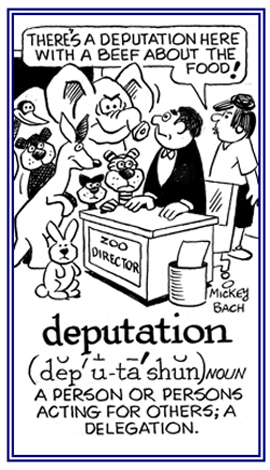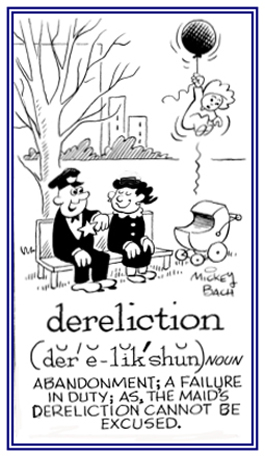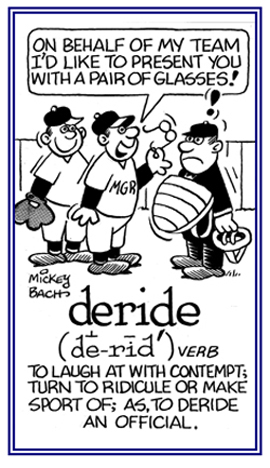de-
(Latin: from, away from, off; down; wholly, entirely, utterly, complete; reverse the action of, undo; the negation or reversal of the notion expressed in the primary or root word)
deprivable (adjective), more deprivable, most deprivable
1. Susceptible of something being withheld: Since Mr. and Mrs. Poor couldn't pay their bills, the electricity was deprivable and they were denied the use of it.
2. Liable to be deposed: In the story Mary was reading, the position of the king was deprivable and he was ousted and put to death.
2. Liable to be deposed: In the story Mary was reading, the position of the king was deprivable and he was ousted and put to death.
deprivation
1. The state of being without or denied something, especially of being without adequate food, water, and/or shelter.
2. The act of taking something away from someone or preventing anyone from having something.
3. An act of depriving someone of food or money or rights.
4. The disadvantage that results from losing something.
5. In medicine, the loss or absence of body parts, organs, powers, or anything that is needed.
2. The act of taking something away from someone or preventing anyone from having something.
3. An act of depriving someone of food or money or rights.
4. The disadvantage that results from losing something.
5. In medicine, the loss or absence of body parts, organs, powers, or anything that is needed.
deprivation amblyopia
The reduction, or dimness of vision, resulting from the non-use of the eye or eyes.
It is usually secondary to an organic problem; such as, cataract or ptosis (drooping of the upper eyelid or eyelids).
deprive (verb), deprives; deprived; depriving
1. To take away possessions from someone.
2. To prevent somebody from having something.
3. To remove or to withhold something from the enjoyment or possession of a person or people.
4. Etymology: From Middle Latin deprivare, from Latin de-, "entirely" + privare, "to release from, to rob".
2. To prevent somebody from having something.
3. To remove or to withhold something from the enjoyment or possession of a person or people.
4. Etymology: From Middle Latin deprivare, from Latin de-, "entirely" + privare, "to release from, to rob".
depriver
Anyone, or anything, that removes or withholds something from the enjoyment or possession of a person or thing.
1. A group of representatives or delegates: Many countries sent deputations to the peace conference.
2. An appointment of subordinates who make decisions: The deputation, which was arranged by the CEO of Frank’s company, allowed experienced employees to determine how to achieve the desired profits with the next big project.
3. An appointment of a person, or people, to represent or to act for another or others: The local hospital has officially permitted the nurses to be deputations who perform some of the medical treatments that doctors normally are responsible for.

© ALL rights are reserved.
Go to this Word A Day Revisited Index
2. An appointment of subordinates who make decisions: The deputation, which was arranged by the CEO of Frank’s company, allowed experienced employees to determine how to achieve the desired profits with the next big project.
3. An appointment of a person, or people, to represent or to act for another or others: The local hospital has officially permitted the nurses to be deputations who perform some of the medical treatments that doctors normally are responsible for.

Go to this Word A Day Revisited Index
so you can see more of Mickey Bach's cartoons.
depute (verb), deputes; deputed; deputing
1. To appoint, or authorize, someone as an agent or a representative.
2. To assign (authority or duties) to another person; a delegate.
2. To assign (authority or duties) to another person; a delegate.
deputize (verb), deputizes; deputized; deputizing
To give someone the authority to take the place of another person and so to function as a substitute: At some hospitals, they have a system that deputizes the nurses to perform some of the same duties as the physicians.
1. An assistant with power to act when his/her superior is absent.
2. Someone authorized to exercise the powers of a sheriff in emergencies.
3. Anyone who is appointed to represent or to act on behalf of others.
4. A representative in a legislative body in certain countries.
2. Someone authorized to exercise the powers of a sheriff in emergencies.
3. Anyone who is appointed to represent or to act on behalf of others.
4. A representative in a legislative body in certain countries.
derail (verb), derails; derailed; derailing
1. To effectuate, to go off, or come off the train tracks: The two trains were derailed because they ran into each other causeing a disastrous accident.
2. To depart from the preceding course or procedure: Jane's daydreaming was derailed when the doorbell rang.
3. To cause to part from a specific course or path of direction: The staff members derailed the principle's presentation of the agenda by leaving the room.
2. To depart from the preceding course or procedure: Jane's daydreaming was derailed when the doorbell rang.
3. To cause to part from a specific course or path of direction: The staff members derailed the principle's presentation of the agenda by leaving the room.
1. The accident of a train leaving the rails along which it had been traveling: The derailment happened when the two trains ran into each other.
2. The case of a debate or a discussion being sidetracked from the initial topic: While talking about general illnesses, Mary suddenly asked a question about the bus schedule which caused a derailment away from the topic of people's ailments.
2. The case of a debate or a discussion being sidetracked from the initial topic: While talking about general illnesses, Mary suddenly asked a question about the bus schedule which caused a derailment away from the topic of people's ailments.
deranged (adjective), more deranged, most deranged
1. Descriptive of someone who is disturbed or upset mentally; insane, crazy: Margaret's deranged brother was unable to think or to act in a normal or logical way after being rescued from drowning when his boat sank in the ocean.
2. Etymology: from French déranger, from Old French desrengier, literally "move from orderly rows".

© ALL rights are reserved.
Go to this Word A Day Revisited Index
2. Etymology: from French déranger, from Old French desrengier, literally "move from orderly rows".

Go to this Word A Day Revisited Index
so you can see more of Mickey Bach's cartoons.
1. A person who is abandoned by society; especially, a person without a permanent home and means of support; a vagrant; a homeless person, a bum.
2. A vessel (a boat or a ship) abandoned in open water by its officers and crew without any hope or intention of returning to it; a ship abandoned on the high seas.
3. Personal property abandoned or thrown away by the owner.
4. Someone who is guilty of neglect of duty: A human derelict is someone who by reason of his/her actions, etc., has been abandoned by respectable people.
5. Etymology: from Latin derelictus, "solitary, deserted"; the past participle of dereliquere. "to abandon, to forsake, to desert"; from de-, "entirely" + relinquere, "to leave behind".
2. A vessel (a boat or a ship) abandoned in open water by its officers and crew without any hope or intention of returning to it; a ship abandoned on the high seas.
3. Personal property abandoned or thrown away by the owner.
4. Someone who is guilty of neglect of duty: A human derelict is someone who by reason of his/her actions, etc., has been abandoned by respectable people.
5. Etymology: from Latin derelictus, "solitary, deserted"; the past participle of dereliquere. "to abandon, to forsake, to desert"; from de-, "entirely" + relinquere, "to leave behind".
1. A deliberate or conscious neglect of someone or something: The security guard at the bank committed a dereliction of his duty when he was not available to stop the robber because the officer was down in the locker room eating a sandwich.
2. An act of not doing what a person or people are responsible for: A dereliction of military duty that soldiers were obligated to perform was the reason for their punishment.
3. Etymology: from the 1590s, "abandonment"; formerly with an extended sense than in modern use; that is, of the sea withdrawing from the land; from Latin derelictionem, derelictio, from the stem of derelinquere, "to forsake wholly, to abandon"; from de- "entirely" + relinquere, "to leave behind".

© ALL rights are reserved.
Go to this Word A Day Revisited Index
2. An act of not doing what a person or people are responsible for: A dereliction of military duty that soldiers were obligated to perform was the reason for their punishment.
3. Etymology: from the 1590s, "abandonment"; formerly with an extended sense than in modern use; that is, of the sea withdrawing from the land; from Latin derelictionem, derelictio, from the stem of derelinquere, "to forsake wholly, to abandon"; from de- "entirely" + relinquere, "to leave behind".

Go to this Word A Day Revisited Index
so you can see more of Mickey Bach's cartoons.
deride (verb), derides; derided; deriding
1. To write or to talk about another person, or something, in a very critical or insulting way: Politicians often attempt to win votes by deriding their opponents.
2. To say that someone or something is of no value or is ridiculous: A newspaper critic derided David's book as dull and worthless.

© ALL rights are reserved.

© ALL rights are reserved.

© ALL rights are reserved.
Go to this Word A Day Revisited Index
2. To say that someone or something is of no value or is ridiculous: A newspaper critic derided David's book as dull and worthless.





